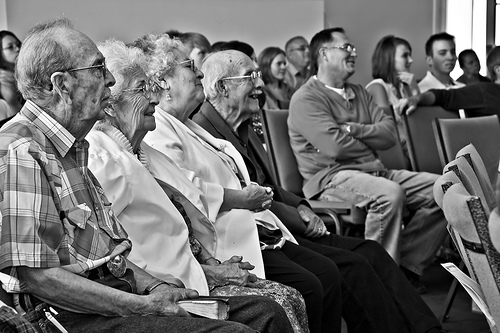
Make sure you ready Joey's post on the trajectory of the league, and get used to seeing him here regularly. Also, I've updated the Amazon widget, but am not going to beat over the head with the reasoning behind the recommendations.
I mentioned this point already on my TSB weekend review, but it's so important it deserves its own post. On the last FDPDOCNBAPC (the podcast), Dan, Shoefly, and myself decided that the "putting it all together for the playoff run" cliche is largely specious. It's almost always the result of injured players coming back and getting into the swing of things at the right time, or the team trading for someone huge at the deadline. It just doesn't make sense that the onset of "real" basketball would suddenly cause a mediocre team to transform into something mighty. Yes, it happens in some other sports; this just proves how random and unconvincing their postseasons are.
Well, I'm here this morning to tell you that we were wrong. Sort of. I'd assumed, like most people, that the KG-less Garnett would be just that: the Celtics, minus their best player, plus everyone else trying to pick up the slack in slightly embarrassing (or at least paltry) fashion. What I certainly didn't count on was seeing a team in the playoffs that, while maybe not as good as the team that equation yielded, is fresh and exciting in new ways. Quite simply, this is a very different Celtics team. For one, the unquestioned star and center of attention is Rajon Rondo, a longtime FD favorite who in these playoffs has asserted himself as part of the "point guards now win games" movement (even if it took the media a few days, and Mark Jackson till overtime on Sunday, to figure this out). I've written at length about the strangeness of Rondo's game, even if I neglected to really break his signature move/nervous tic—the behind-the-back fake that, in effect, feigns the element of surprise in an attempt to gain the element of surprise (a double-negative? net result, zero? the key to Rondo's everywhere/nowhere style?). Suffice it to say that in this series, Rondo's used the playoffs as a platform to expose his most potent essence.
But this isn't only about Rondo's welcome-here parade. It's fascinating to watch the overall dynamic of the team develop, as something quite different from the previous (incarnation of) The Big Three (minus one) gives way to, well, a team for the future. Pierce has been far less conspicious, functioning not as someone who would brag he could take Kobe, but a wily veteran whose scoring is deployed selectively and attracts a lot of defensive attention. Allen has been thus pigeon-holed the whole time he's been in Boston—disastrously the first season, to far better effect this year. These playoffs, Ray Ray's not being asked to hit too many stand-still jumpers (he hates those, I've realized) or create for himself (not clear he can do that these days). Instead, he's coming off of screens like a champ, staying in motion so he gets the kind of shot he thrives on: An eye-blink clear look, for a split-second, from an absolutely exact spot on the floor.

In short, the older dudes, while still key producers—ironically, Allen more so than Pierce—are beginning to gracefully recede from the foreground, or at least play in a way that's not going to fall off a cliff one day. At the same time, Big Baby and Perkins, while hardly anyone's idea of a formidable front court, are playing solid, well-rounded basketball that makes it possible to imagine life without Garnett. The Celtics are, for lack of a better word, pulling a Dumars without even meaning to (by the logic of a TSB post last week, would this make Rondo into Bias?). The team's different, but they have less rigid, more malleable identity that serves them well going forward. Damn you, Danny Ainge!
The Bulls, I feel even worse for maligning going into the playoffs. Maybe that's because they've tried to rebuild three times in a row now, and have a roster that reads like a geological cross-section of failed recent history. There's also just something really unseemly about this year's additions: Pull the ROY out of a hat, and then tack on two vets way late just for the hell of it. This team seemed like glimpses at several different philosophies, held together with glue and mud, with a non-coach coaching it all. And then somehow, everyone (and what they stand for) ended up facing the same direction. We need not speak much of Derrick Rose, except to say that as a 20 year-old, he's solidified his standing as somewhere between that Game One juggernaut and the off-nights we saw throughout the season (and elsewhere in this series).
Now, as if by miracle, suddenly this patchwork team makes perfect sense. Ben Gordon, possibly the most boring enigma in basketball history, was perfect as the fearless scorer who, for the most part, realizes there's a time and place for his would-be heroic. Hinrich, too, is a role player extraordinaire: Expert defender, long-range option, scraggly grit monster, can handle the ball. Tyrus Thomas and Joakim Noah are far more mercurial than Davis and Perkins, but they can finally take the floor together as a big man tandemn of tomorrow. Noah's all hustle (real, these days) and elegant effort, Thomas has that jumper to go with his arsenal of general havoc-wreaking. Backed up by Miller and Salmons, vets perfectly content to occasionally remind us that they were once capable of star-caliber play, insurance policies willing to come in to steady or bring order to this tenuous assemblage. The Bulls, rather than looking like the unrelated wreckage of front office chicanery, are instead a real team. If just for this series.
I don't see this like last year's Hawks, or the Warriors of 2007. There's not the sense that these teams are living on the edge, or betting the farm on something outlandish. And maybe this does fall under my original rubric of players discovering their limits, for better or worse, in the playoffs (I would say that last year, Iguodala experienced the latter; this year, the former). I think we can say, however, that we're seeing off-season concerns seamlessly dealt with at the most high-pressure part of the season. Maybe you could call it a fluke, except these teams just keep honing these new models, and the whole things just makes too much sense. The individual/team key might be thus: When one or two key guys outstrip themselves, all of a sudden it's contagious. Boston's was brought about by necessity; Chicago's, on the other hand, is almost inexplicable, especially in the way it caps off an entire season of muddle. It begins with Derrick Rose, but you've got to give everyone on the team credit, one-by-one. And that's how a team puts it all together: By everyone involved catching some individual inspiration.
















No comments:
Post a Comment